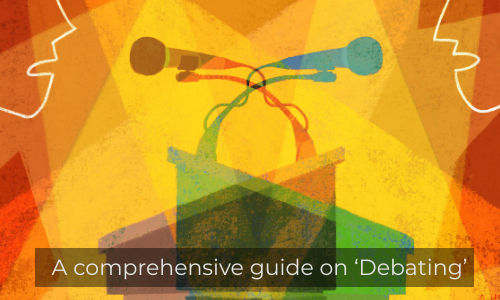
A comprehensive guide on ‘Debating’
A debate is a simple construction of a structured argument where two sides or parties speak alternately for and against the motion based on a particular contention of a topical issue. Here, the subject of the dispute is often pre-arranged for the ones engaged in it so that they can easily find themselves in the side of supporting opinions and facts. In schools and colleges, it is considered to be an excellent platform for improving speaking and communication skills and is particularly helpful in providing relevant experience and knowledge in developing a convincing argument. Preparing for debates takes the right amount of ingredients in the process to get the best outcome, so you need to make sure that you are well-equipped with it before starting the argument.
However, the stage of choosing the right ingredients for your debate topic is one of the most complicated exercises of all time. You must put all the right slang and accumulate the host of relevant information in support of the subject matter, which is not an easy task to perform. The process involves the objectification of prioritizing all the aspects and steps of the process, which are relevant for the subject.
Significance of good debate topics
Apart from just focusing on the process and preparation for the debate, the first thing that you need to do is choose an interesting topic for an argument. Debate topics usually come in various forms, where some are good for the argument, and others are a bit controversial. All you need to do is choose a topic that maintains a steady balance between the good and argumentative sections of the content. Remember that not all argumentative topics for debate are good for an argument. At times, some of them might appear to be narrow, irrelevant to the current situation and dangerously controversial to some extent. So, take a note of the benefits of choosing a good debate topic for your argumentative essay that yearns out the best results in the context-
- Students tend to engage themselves more with the help of such engaging and learner-centric activities, and good debate topic paves the way for such an active discussion.
- Picking a good debate topic gives you the opportunity to become productive towards brainstorming and knowledge sharing sessions.
- It enhances the ability of students to structure and organize their thoughts in a uniformed manner.
- Students also develop effective speech composition and delivery skills by selecting good topics for their debate session.
- Good debate topics also help students gain multi-faceted knowledge across various subjects and matters, beyond the concept of academic lessons.
- Choosing productive and insightful topics for debate helps young learners gain confidence, enrich poise and develop self-esteem in them.
Preparing for debate
The knowledge of gaining insightful comments about choosing a good debate topic would not work, until and unless you prepare well for the productive debate session. Students must learn the ability to walk through the preparatory stages of debate before entering one.
Hold proactive brainstorming sessions
Make sure that you focus on individual brainstorming sessions. Spare a few minutes to yourself and focus on the subject matter carefully; then jot down every single relatable thing that strikes your mind. Go for the group brainstorming session, once you’ve completed the individual one.
Organize the ideas and thoughts you collected
Once you’ve collected all the basic and relevant information for the subject matter, now is the time for you to focus on organizing your ideas accumulated during the brainstorming session. Identify all those points you’ve picked during the brainstorming session. Do not just focus on the significant ones, rather jot down all the similar points together. Give a name to each argument and write down the content based on the context of your debate speech.
Structure the pieces of content
This stage involves the structuring of your debate speech, which basically includes-
Introduction: Mention who you are and what is the cause of your argument.
Preview: Cover the names of arguments you are going to discuss further.
Rational perspectives: First thing that you need to do is come up with a generic overview of the points of your argument. Your rational perspective should be to disagree with the points and establishment of your own points.
Primary point: Establish your points with confidence.
Secondary point: Mention the valuable reason to support your point. Provide relevant facts and evidence.
Reminder: The last thing that you need to do is remind your audience about the points you covered so far. Try making a link between the rational perspective and the arguments you presented.
The behavioral aspect of debate
One can never be a good debater if there isn’t a basic courtesy to perform, present and adherence to debating ethics. Therefore, you need to be well aware of the concept of ethics and behaving.
- A debate should always look like a healthy representation of facts; never go personal.
- Focus solely on the notion of establishing your primary point of arguments, do not end with some personal remarks.
- You need to keep calm while performing, instead of just shouting or showing anger.
- Be clear with your thoughts and feel confident about what you speak in front of the audience.
- Explain your logic behind the argumentative point, while supporting it with some relevant facts and evidence.
Whether you are writing a debate for an argumentative essay or presenting it verbally before the audience, you should always remember that your debate should aim at delivering relevant solutions for the problems concerned. Its mere focus should be on the key takeaways that help the audience perceive things from your perspective. Behavioral issues, including physical or verbal abuse, personal attacks and fights, will only ruin the very essence of establishing your point before the audience, so be careful at what you speak and write.




